| KPV 14.5×114 mm machine gun | |
|---|---|
.jpg.webp) Four KPV heavy machine guns used on the ZPU-4 anti-aircraft gun. | |
| Type | Heavy machine gun |
| Place of origin | Soviet Union |
| Service history | |
| In service | 1949–present |
| Used by | See Operators |
| Wars | Korean War Vietnam War Western Sahara War[1] Afghan-Soviet War[2] Libyan-Chadian conflict Gulf War First Chechen War Second Chechen War Russo-Georgian War Iraq War Lebanese Civil War First Libyan Civil War Second Libyan Civil War Syrian Civil War[3] Iraqi Civil War (2014–2017) Russo-Ukrainian War Yemeni Civil War (2015–present) Saudi Arabian-led intervention in Yemen Saudi–Yemeni border conflict (2015–present) |
| Production history | |
| Designer | Semyon Vladimirov |
| Designed | 1944 |
| Manufacturer | V.A. Degtyarev Plant |
| Produced | 1949–present |
| Variants | KPVT |
| Specifications | |
| Mass | 49 kg (108.03 lb) |
| Length | 1,980 mm (78.0 in) |
| Barrel length | 1,346 mm (53.0 in) |
| Width | 162 mm (6.4 in) |
| Height | 225 mm (8.9 in) |
| Cartridge | 14.5×114mm |
| Caliber | 14.5 mm |
| Action | Short recoil operation |
| Rate of fire | 600 rpm |
| Muzzle velocity | 1,005 m/s (3,297 ft/s) |
| Effective firing range | 3,000 m (9,800 ft) |
| Maximum firing range | 4,000 m (13,000 ft) |
| Feed system | 40-round belt |
| Sights | iron or optical |
The KPV-14.5 heavy machine gun (KPV is an initialism for Krupnokaliberniy Pulemyot Vladimirova (Vladimirov's large-caliber machine gun), in Russian as Крупнокалиберный Пулемёт Владимирова, or КПВ) is a Soviet designed 14.5×114mm-caliber heavy machine gun, which first entered service as an infantry weapon (designated PKP) in 1949. In the 1960s, the infantry version was taken out of production because it was too large and heavy. It was later redesigned for anti-aircraft use, because it showed excellent results as an AA gun, with a range of 3,000 m (9,800 ft) horizontally and 2,000 m (6,600 ft) vertically against low flying planes.[4] It was used in the ZPU series of anti-aircraft guns. Its size and power also made it a useful light anti-armour weapon on the BTR series of vehicles and the BRDM-2 scout car.
Mechanics
The KPV was a heavy machine gun developed by S. V. Vladimirov. It was developed in 1944 and adopted in 1949. It combines the rate of fire of a heavy machine gun with the armor-piercing capabilities of antitank rifles and was designed to combat lightly armored targets, firepower and manpower of the enemy located behind light cover, as well as to be an anti-aircraft machine gun. The muzzle energy of the KPV reaches 31 kJ. For comparison, the 12.7 mm Browning M2HB machine gun has up to 19 kJ (14,000 ft⋅lbf) with a 660 gr (43 g) bullet traveling at 3,080 ft/s (940 m/s) manufactured by PMC, the 20 mm ShVAK aircraft mounted gun has about 28 kJ (21,000 ft⋅lbf). It is one of the most powerful machine guns ever used by the Soviet and later Russian armed forces. The development of the machine gun began in 1944. The 14.5×114mm M41 cartridge can be used with high explosive incendiary - tracer (HEI-T) or armor-piercing incendiary (API) bullets. The KPV is air-cooled and fitted with a barrel with a hard chrome plated bore. It uses a short recoil operation system with gas assistance and a rotary bolt. It can be fed with the 40-round metallic belt from either the left or right side. The barrel can be removed by turning the prominent latch on the forward end of the receiver and pulling on the barrel's carrying handle.

Versions
KPVT
The version for use in armored vehicles is called the KPVT (tankoviy, 'tank'). KPVT is used for armored vehicle installations, boats, movable and stationary mounts and various antiaircraft mounts. It features a shorter receiver and a heavier barrel jacket. The KPVT also uses a 50-round belt instead of the original 40-round belt. KPVTs are the primary armament of the wheeled BTR-60PB/70/80 series armored personnel carriers and BRDM-2 armored reconnaissance vehicles. It is intended for fighting against lightly armored targets, weapons systems and light shelters at the distances of up to 3,000 m (9,800 ft), as well as air targets at distances up to 2,000 m (6,600 ft).
The distance at which the bullet retains lethal force is 8 km (5.0 mi).[5] The maximum flight range of the bullet is 9 km (5.6 mi).
Naval armament
The naval version was called the "marine tumbovaya" (MTPU). It was mounted in the following turrets; 2M-5 was for torpedo boats, the 2M-6 for patrol boats, and the 2M-7 for trawlers. The 14.5 mm marine pedestal machine gun mount (14.5 mm MTPU) is intended for combat against armored surface, coast and air targets. It is mounted on decks of boats and can defeat surface and coast targets with a range of 3,000 m (9,800 ft) horizontally and 2,000 m (6,600 ft) vertically against low flying planes.[6]
ZPU
The ZPU is a towed anti-aircraft gun based on the KPV. It entered service with the Soviet Union in 1949 and is used by over 50 countries worldwide.
- ZPU-1 single-barreled
- ZPU-2 double-barreled
- ZPU-4 quadruple-barreled
Remote weapon stations
The Emirati remote weapon station IGG-RWS14 uses the KPV machine gun.[7]
Gallery
.jpg.webp) SU-122-54 with a KPVT mounted on top of the hull and another in a coaxial mounting next to the main cannon
SU-122-54 with a KPVT mounted on top of the hull and another in a coaxial mounting next to the main cannon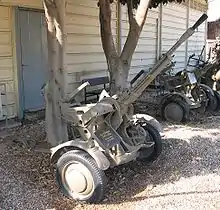 ZPU-1 single barrel AAA mount
ZPU-1 single barrel AAA mount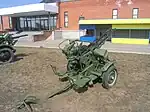 ZPU-2 twin barrel AAA mount
ZPU-2 twin barrel AAA mount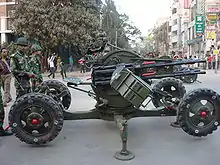 Bangladesh Army ZPU-4
Bangladesh Army ZPU-4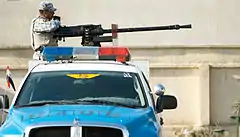
 Shipboard ZM-5
Shipboard ZM-5
Ammunition
- B-32 - Armor-piercing incendiary full metal jacket round with a tungsten-carbide core. Projectile weight is 64.4 g (2.27 oz) and muzzle velocity is 976 m/s (3,200 ft/s). Armor penetration at 500 m (1,600 ft) is 32 mm (1.3 in) of rolled homogeneous armour (RHA) at 90 degrees.
- BZT - Armor-piercing incendiary tracer full metal jacket round with a steel core. Projectile weight is 59.56 g (2.101 oz) and muzzle velocity is 1,005 m/s (3,300 ft/s). Tracer burns to at least 2,000 m (6,600 ft).
- MDZ - High-explosive incendiary bullet of instant action. Projectile weight is 59.68 g (2.105 oz).
These rounds are also produced in Bulgaria, China, Egypt, Poland, and Romania.
Operators
 Afghanistan[8][2]
Afghanistan[8][2] Albania[9]
Albania[9] Algeria
Algeria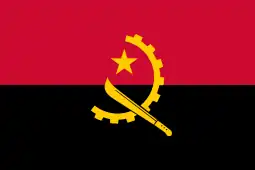 Angola
Angola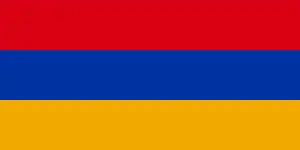 Armenia
Armenia Bangladesh
Bangladesh Benin[10]
Benin[10] Bulgaria: locally produced[11]
Bulgaria: locally produced[11] Cambodia[12]
Cambodia[12] Cameroon[13]
Cameroon[13] Congo[14]
Congo[14] China: Type 56 (KPV) and Type 58 (KPVT) machine guns, produced by Norinco[11]
China: Type 56 (KPV) and Type 58 (KPVT) machine guns, produced by Norinco[11]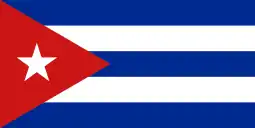 Cuba
Cuba Czechoslovakia (ex)
Czechoslovakia (ex) Egypt[2]
Egypt[2] Eritrea
Eritrea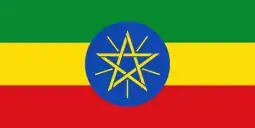 Ethiopia
Ethiopia Finland (KPVT)
Finland (KPVT) Georgia
Georgia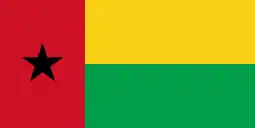 Guinea-Bissau[15]
Guinea-Bissau[15] Hungary
Hungary India - Manufactured at Ordnance Factory Tiruchirappalli[16]
India - Manufactured at Ordnance Factory Tiruchirappalli[16] Iraq- Iraqi armed forces
Iraq- Iraqi armed forces
 Iran
Iran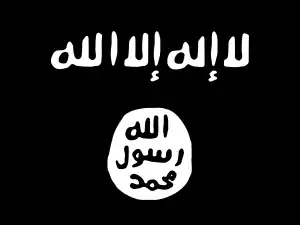 Islamic State[3]
Islamic State[3] Ivory Coast[17]
Ivory Coast[17]- Izz ad-Din al-Qassam Brigades
 Laos
Laos Lebanon
Lebanon Libya
Libya Malawi[18]
Malawi[18] Mali - Armed and Security Forces of Mali
Mali - Armed and Security Forces of Mali Malta - North Korea-made KPVs[11]
Malta - North Korea-made KPVs[11] Mongolia
Mongolia Morocco
Morocco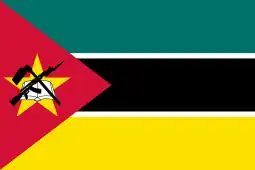 Mozambique
Mozambique Myanmar
Myanmar North Korea
North Korea Nicaragua
Nicaragua Pakistan: Used by the Pakistan Army.[19]
Pakistan: Used by the Pakistan Army.[19] Panama
Panama Poland[11]
Poland[11] Romania: KPV and KPVT built under license[20]
Romania: KPV and KPVT built under license[20] Russia[11]
Russia[11] Sahrawi Arab Democratic Republic[1]
Sahrawi Arab Democratic Republic[1] São Tomé and Príncipe[21]
São Tomé and Príncipe[21] Serbia (KPVT)
Serbia (KPVT) Sierra Leone: Chinese QJG56 and Polish KPVT[22]
Sierra Leone: Chinese QJG56 and Polish KPVT[22] Slovenia (KPVT)
Slovenia (KPVT) Somalia
Somalia South Africa[23]
South Africa[23] Soviet Union (ex)
Soviet Union (ex) Sri Lanka
Sri Lanka
 Sudan
Sudan Syria
Syria Togo[24]
Togo[24] Ukraine
Ukraine Yemen
Yemen Vietnam
Vietnam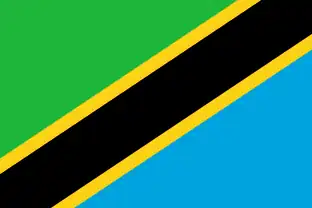 Tanzania[25]
Tanzania[25] Zimbabwe
Zimbabwe
See also
- Weapons featured in the film 13 Hours: The Secret Soldiers of Benghazi.
References
- 1 2 Francesco Palmas (2012). "Il contenzioso del sahara occidentale fra passato e presente" (PDF). Informazioni della Difesa (in Italian). No. 4. pp. 50–59.
- 1 2 3 Campbell, David (30 November 2017). Soviet Paratrooper vs Mujahideen Fighter: Afghanistan 1979–89. Combat 29. Osprey Publishing. p. 26. ISBN 9781472817648.
- 1 2 "Syrie: l'EI inflige un revers aux FDS dans l'est, mais reste acculé". France Soir (in French). 25 October 2018.
- ↑ "KPVT large-calibre tank machine-gun". Retrieved 26 November 2014.
- ↑ "КПВ — крупнокалиберный пулемёт Владимирова | Армейский вестник".
- ↑ "MTPU 14.5mm marine pedestal machine gun mount". Retrieved 26 November 2014.
- ↑ "[DSEi 2017] Vehicle Mounted Remote Control Weapon Station Round up -". 6 October 2017.
- ↑ Bhatia, Michael Vinai; Sedra, Mark (May 2008). Small Arms Survey (ed.). Afghanistan, Arms and Conflict: Armed Groups, Disarmament and Security in a Post-War Society. Routledge. p. 66. ISBN 978-0-415-45308-0.
- ↑ Gander, Terry J. (22 November 2000). "National inventories, Albania". Jane's Infantry Weapons 2001-2002. p. 445.
- ↑ Gander, Terry J. (22 November 2000). "National inventories, Benin". Jane's Infantry Weapons 2001-2002. p. 948.
- 1 2 3 4 5 Gander, Terry J. (4 May 2001). "14.5 mm KPV heavy machine gun". Jane's Infantry Weapons 2002-2003. pp. 3732–3734.
- ↑ Gander, Terry J. (22 November 2000). "National inventories, Cambodia". Jane's Infantry Weapons 2001-2002. p. 1134.
- ↑ Gander, Terry J. (22 November 2000). "National inventories, Cameroon". Jane's Infantry Weapons 2001-2002. p. 1135.
- ↑ Gander, Terry J. (22 November 2000). "National inventories, Congo". Jane's Infantry Weapons 2001-2002. p. 1441.
- ↑ Gander, Terry J. (22 November 2000). "National inventories, Guinea-Bissau". Jane's Infantry Weapons 2001-2002. p. 2361.
- ↑ "OFT develops Gen-X weapons". www.oneindia.com. 19 March 2007. Retrieved 26 November 2014.
- ↑ de Tessières, Savannah (April 2012). Enquête nationale sur les armes légères et de petit calibre en Côte d'Ivoire: les défis du contrôle des armes et de la lutte contre la violence armée avant la crise post-électorale (PDF) (Report). Special Report No. 14 (in French). UNDP, Commission Nationale de Lutte contre la Prolifération et la Circulation Illicite des Armes Légères et de Petit Calibre and Small Arms Survey. p. 97. Archived from the original (PDF) on 18 November 2012.
- ↑ Gander, Terry J. (22 November 2000). "National inventories, Malawi". Jane's Infantry Weapons 2001-2002. p. 3094.
- ↑ "KPV".
- ↑ Gander, Terry J. (4 May 2001). "ROMARM machine guns". Jane's Infantry Weapons 2002-2003. p. 3407.
- ↑ Gander, Terry J. (22 November 2000). "National inventories, São Tomé and Príncipe". Jane's Infantry Weapons 2001-2002. p. 3849.
- ↑ "World Infantry Weapons: Sierra Leone". 2013. Archived from the original on 24 November 2016.
- ↑ Engelbrecht, Leon (17 December 2009). "Fact file: Special Forces main equipment". defenceweb.co.za.
- ↑ Gander, Terry J. (22 November 2000). "National inventories, Togo". Jane's Infantry Weapons 2001-2002. p. 4569.
- ↑ "Google Sites".
- Suermondt, Jan (2004). Illustrated Guide to Combat Weapons. Kent: Grange Books. p. 104.
- Koll, Christian (2009). Soviet Cannon - A Comprehensive Study of Soviet Arms and Ammunition in Calibres 12.7mm to 57mm. Austria: Koll. p. 98. ISBN 978-3-200-01445-9.
- Moise, Edwin (1996). Tonkin Gulf and the Escalation of the Vietnam War. United States: The University of North Carolina Press. ISBN 0-8078-2300-7.
External links
| External videos | |
|---|---|
- KPVT large-calibre tank machine-gun
- MTPU 14.5mm marine pedestal machine-gun mount
- Russian/Soviet KPV MACHINE GUN ON WHEELED MOUNT (MARKOV'S MOUNT) IN 14.5 x 114 calibre (M41/44) – Walk around photos
- ZPU-2 - TWIN MOUNT 14.5MM ANTI-AIRCRAFT GUNS (Twin mount anti-aircraft 14.5mm KPV machine guns) – Walk around photos Archived 7 March 2009 at the Wayback Machine
- Modern Firearms page on the KPV-14.5 heavy machine gun Archived 6 April 2008 at the Wayback Machine